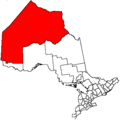Weenusk First Nation
Weenusk First Nation's reserve is the 5310 ha Winisk Indian Reserve 90. Associated with the reserve is their Winisk Indian Settlement also known as Peawanuck, which also holds reserve status. Originally, the Weenusk First Nation was located within their reserve, but they were forced to move 30 km (19 mi) southwest to Peawanuck when on May 16, 1986, spring floods swept away much of the original settlement, which had been located 6 km (4 mi) upriver from Hudson Bay.
In the Cree language, "Peawanuck" means "a place where flint is found," while "Weenusk" means "ground hog." The community, being primarily Swampy Cree, speaks the n-dialect of the Cree language. Being that the community is composed of Cree, Oji-cree, Ojibwa and Métis peoples, in addition to Cree, Anishininiimowin and Ojibwemowin are also spoken there.
Governance
Weenusk is governed by Chief Joey Hunter and his three councillors: Jeff Hunter, Leah Hunter, and Paul Koostachin.
External links
- Chiefs of Ontario profile Archived 2010-10-17 at the Wayback Machine
- Detailed community profile from the Wakenagun Development Corporation
- AANDC profile
References
- ^ Long, John S. (2010-11-19). Treaty No. 9: Making the Agreement to Share the Land in Far Northern Ontario in 1905. McGill-Queen's Press - MQUP. ISBN 978-0-7735-8135-7.
- ^ Foster, Karen R.; Jarman, Jennifer (2022-03-03). The Right to Be Rural. University of Alberta. ISBN 978-1-77212-595-5.
55°01′13″N 85°42′28″W / 55.02028°N 85.70778°W
